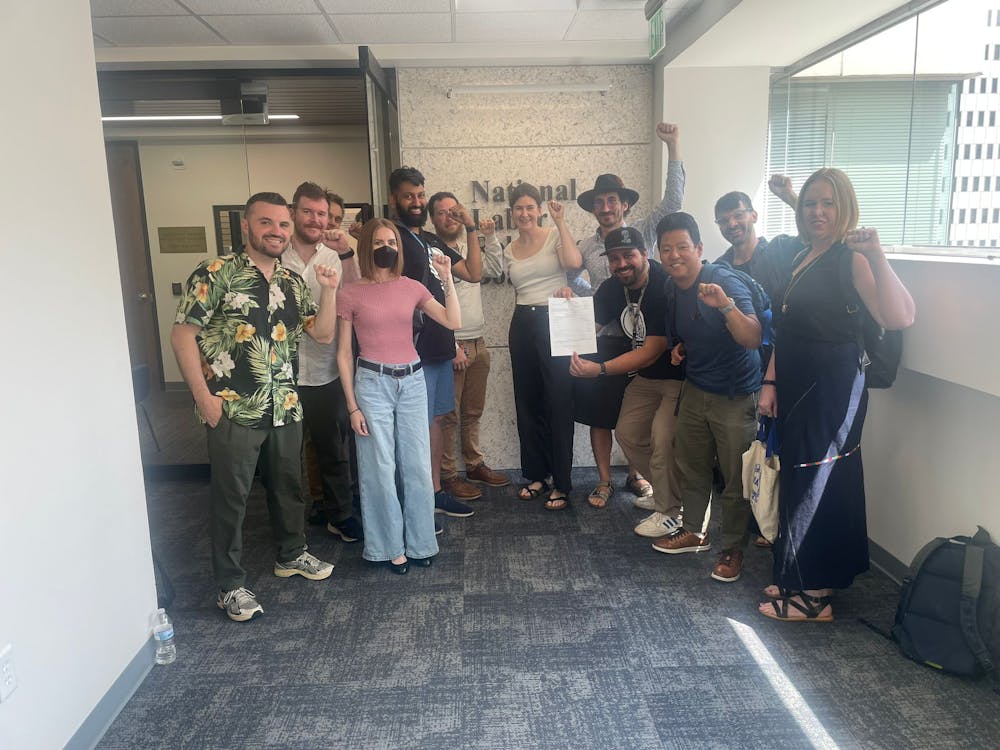In the aftermath of the 2016 presidential election, many Americans have started to question the stability of the U.S. Constitution during the upcoming Trump presidency.
Constitutional law scholars Sanford Levinson, the Garwood Centennial Chair at the University of Texas Law School, and Michael Greve, a professor of the Antonin Scalia Law School at George Mason University, debated the meaning of the constitution in the era of Trump on Thursday in Hodson.
Steven Teles, an associate professor of political science, moderated the discussion.
In his introduction, Teles spoke about exploring whether the U.S. Constitution lives up to the needs of an increasingly partisan and divisive modern America.
With this in mind, Teles said the idea behind this talk was to hear from experts in the field of political science from both sides of the political spectrum.
Levinson began the debate by criticizing the Constitution for not living up to democratic ideals.
“By reference to 21st century theories of democracy, the United States Constitution is not only clearly and demonstrably the most undemocratic constitution in what we might refer to as the Democratic West, but also, and at least as interesting, is the most undemocratic of the 51 constitutions in the United States,” he said.
Additionally, according to Levinson, if the same Constitution were to be written and implemented at any point after the time of the 1787 Constitutional Convention, it likely would not have been ratified. He cited the current partisanship of the judiciary and the continued existence of the Electoral College as examples of what has led Americans to question the government’s role.
With regards to Trump’s victory, Levinson doubts that the president-elect has an understanding of key aspects of the Constitution like the separation of powers or how the Senate and the House of Representatives works.
“I think what he has an understanding of is demagogy, and he is undoubtedly the most brilliant demagogue in our collective lifetimes,” Levinson said, “The election of Donald Trump calls into question the validity of the belief that Americans are capable of sound reflection of choice in our own elections.”
Levinson believes the entire the Constitution needs to be radically reassessed. He proposed that the country hold a new Constitutional Convention consisting of a randomly selected citizen’s jury with experts from both the left and the right in the field of political science.
“My view is that the Constitution was and remains radically defective,” he said. “I want us at least to address the Constitution in all of its features and to really decide whether it serves us well in 2016. I think the answer is no.”
Greve, on the other hand, saw the prospects of stability under Trump’s presidency in a more positive light.
“Post-election, I’m cautiously optimistic, in some ways, about the prospect of restoring some modicum of constitutional order,” Greve said. “The partisan constellation on the Hill now in Washington may offer opportunities to restore somewhat more transactional politics... So Congress may actually learn or relearn how to legislate, and the system may come to look a little more like the separation of powers we once knew.”
Greve disagreed with the notion that fundamental problems lie within the Constitution itself, and that there is a need for another Constitutional Convention.
Rather, he believes that the deficiencies lie in the government’s day to day functions and the execution of its responsibilities. However, at the same time, he doubts the government will take action any time soon to ease its gridlock.
“We’re not supposed to have this upside down Constitution. We’re not supposed to have this unconstrained executive or a Supreme Court that acts as a sort of rolling Constitutional convention,” Greve said. “How did that happen? It’s not that this, that, or the other clause of the constitution is wrong and could be fixed. That’s parchment thought. It’s that some of the premises on which the system rests have proven wrong or inoperative.”
Senior Christian Cayon appreciated the opportunity to hear perspectives from both sides of the aisle.
“It was cool, especially the fact that they were representing two sides of the political spectrum: the left and the right and asking deep, philosophical, political questions about our country as a whole,” Cayon said. “Some things, admittedly did go over my head, especially not having a political science background, but I really did enjoy hearing especially from academics like these.”
Junior Jared Mayer agreed, adding that these kinds of events are especially important given the partisanship that has become characteristic in our country.
“Right now we’re seeing this political fracture not only along lines of ideology, which is alarming in its own way but also in the inability of Americans to sit down and discuss fundamental issues and questions related to our common governance,” Mayer said. “It’s incredibly important, even at a campus like Hopkins, which is relatively speaking, politically mild, for students nonetheless to be educated.”




